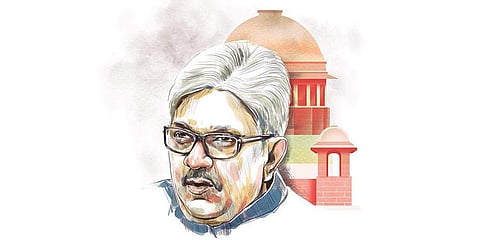

NEW DELHI: Amid a controversy over lowering of Justice K M Joseph's seniority while appointing him to the Supreme Court, the government today defended the move, saying it went purely by the "time-tested" principle of high court seniority list.
Top sources in the government said here that Justice Joseph is two and a half years junior to justices Indira Banerjee and Vineet Saran in all-India seniority of high court judges.
But some senior judges are upset as they feel that since Justice Joseph's name was in-principle reiterated before the recommendation for justices Banerjee and Saran was made, he should have been their senior in the top court.
But government sources said the in-principle reiteration came to the government in July along with two other names.
They pointed out that the executive "went purely by the time-tested principle of the high court seniority list" in placing Justice Joseph below justices Banerjee and Saran.
Quoting the resolution of the Supreme Court collegium recommending their elevation to the top court, they said Justice Banerjee was appointed as a high court (HC) judge on February 5, 2002, while Justice Saran was appointed as an HC judge on February 14, 2002.
Justice Joseph was appointed as a high court judge on October 14, 2004.
"In the all-India seniority of high court judges, Justice Banerjee is at number 4 while Justice Saran is at number 5. Justice Joseph is at the 39th place," a source said.
It was pointed out that none of the three judges will become the Chief Justice of India (CJI) as there are other SC judges who have been elevated to the apex court earlier and they will also retire later.
They said while Justice Joseph will retire on June 16, 2023, Justice D Y Chandrachud, who is senior to all the three judges, will continue till November 2024.
The sources recalled that CJI Dipak Misra had become a high court judge on January 17, 1996, while Justice J Chelameswar became a high court judge on June 23, 1997.
Justice Chelameswar became the chief justice of a high court on May 3, 2007, while Justice Misra became chief justice of an HC on December 23, 2009.
They said the appointment as chief justice of a high court does not alter the seniority of HC judges in the all-India seniority register.
Therefore, Justice Misra took oath as a Supreme Court judge before Justice Chelameswar on the same day and remained senior to him based on the seniority according to seniority list of HC judges.
Justice Joseph's elevation to the apex court put an end to a protracted stand-off between the government and the judiciary as his file was once returned for reconsideration.
The number of judges in the top court after the fresh appointments has gone up to 25.
There are still six vacancies. The collegium had, on May 16, in-principle reiterated the decision to recommend Justice Joseph's name for elevation to the apex court.
The recommendation was sent to the government in July and it was accepted.